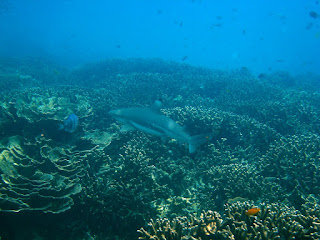
At one point, we were surrounded by a group of about 6-8 batfish who were curious and at the same time playful.
To be up, close and personal with fish, and other marine life in their original and natural environment left me awe-struck.
After a good 10 minutes of playing with the batfish, we started swimming away. When we turned our heads back, much to our delight, there were 2 of them tailing us! These 2 followed us for quite a while, before deciding that we weren’t gonna play with them anymore, and then they left.
How cool was that?
Did you know that sea urchins can be eaten raw?
Inside its mean looking exterior is a yellowish gooey whatchamacalit, which the Japanese love. Nuh uh, as much as I love my sushi and sashimi, I’m not about to excite my palate with this.
Oh, and their eyes and arsehole are brightly coloured against the black.
There were plenty of sea urchins around the Swiss House Reef. Apparently, the presence of sea urchins in huge numbers indicates polluted water as these spiky creatures feed on yucky stuff.
During one of our dives, Lynette lifted a sea urchin off the ground by holding on to one of its sharp-pokey thing. What we saw after that was like watching National Geographic, but instead of watching it thru the idiot box, we were there witnessing it - LIVE. The smaller fish began crowding around the exposed sea urchin and started nibbling at the urchin from below (no sharp-pokey thing underneath!).
Our nosey tuskfish on the other hand, just opened his mouth and took a big bite off the urchin, chewed for a bit, and then spit the pokey things out. What the tuskfish did also provided the smaller fish with more access in feeding on the sea urchin.
Albert wanted to get a little bit more acquainted with this little fella here.
Because they don’t have sharp-pokey things on the underside of them, you can actually rest it on your palm and feel its little legs moving about.
Lewis on the other hand got to know the sea urchins a little bit more than he wanted to.
I don’t quite remember how or when it happened, but he basically under-estimated the distance of those creatures before putting his fin down on the sand, and his ankles grazed against the sharp-pokey things.
When they poke you, a wee bit of their sharp-pokey things snaps off under your skin and stays there. Lewis had a couple of tiny black spots on his ankle, remnants of the black spikes. We were told that their pokey things are calcium-based, and that it would dissolve eventually. Did it hurt? Just like a needle poke apparently.
Can you imagine landing on a sea urchin on your ass?
Whoopeeee.
Did you know that Nemo is not the name of the species and that this name is merely fictional? (DUH?!)
The clownfish live amidst the anemone corals, and that’s how the writers from Finding Nemo got the ‘Nemo’ name.
Albert loves them.
We thought that the clownfish was being really friendly, swimming up towards his face. Later found out that the bugger was actually being defensive, coming up and warning you to stay out of his crib.
Damn small. One bite also can swallow the fella.
Did you know that you can tell when a shark is nearby even without sighting the actual shark yet?
You look out for their friends, the cleaner wrasse. Obviously you first need to know how to ID this cleaner wrasse. (The author does not know what a cleaner wrasse looks like at time of publishing. She will need to go back and refer to the dive log as she clearly remembered noting it down).

But when we went back to Renggis the next day, we saw not one, but TWO black-tipped sharks!
Did you know that when barracudas need to take a dump, they usually leave the school and do it alone cos they are ashamed by the act of defecating?

Just don't quote me on that.
-------------
Photo credit - Lynette Yee




No comments:
Post a Comment